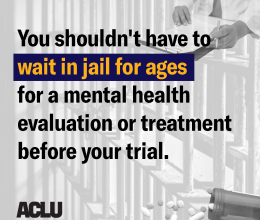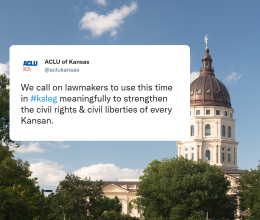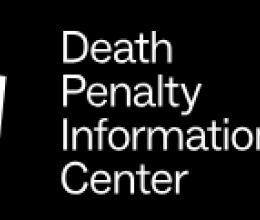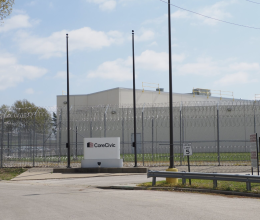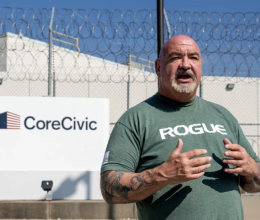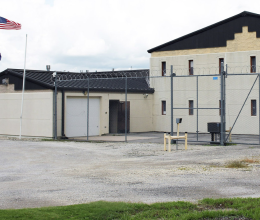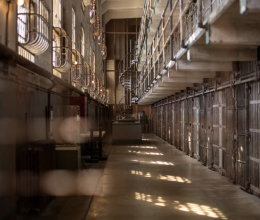Our criminal legal system punishes poverty, mental illness, and substance use while creating a cycle of harm and violence. Our expensive, punishment-based framework has failed to make us safer and instead has separated and financially exploited Kansas families, disproportionately devastating Black communities. Our communities can be safer, healthier, and more vibrant through evidence-based solutions to complicated health, economic, and safety questions that demand deeper answers than simply criminalizing our fellow Kansans.
Reimagining our criminal legal system is not a partisan, ideological, or political issue. It is an issue that impacts all of us.
We envision a criminal legal system in which one's treatment or freedom is not dependent on their wealth; that reduces the number of incarcerated people; that uses taxpayer dollars wisely and invests in the evidence-based solutions that truly keep our communities safe and strong; and that respects the rights of all who come into contact with it.
PRIORITY 1: Securing the elimination of juvenile fines and fees statewide.
We are part of the Debt Free Justice Kansas coalition that seeks to abolish the debt that destroys futures for our kids. Our courts charge children in the justice system and their families thousands of dollars in unjust fines and fees at nearly every step. These financial penalties undermine public safety and family stability, punish poverty, deepen existing racial and economic disparities, and set up young people to fail for years to come. By requiring juveniles too young to hold a job to pay fines and fees, we place the burden of harsh punishment on working families—many of whom already live paycheck to paycheck—thereby trapping them into a cycle of debt, tearing the community fabric, and harming public safety.
Children don't pay bills or get jobs -- therefore by requiring juveniles to pay fines and fees, our system places the burden of harsh punishment on working families, many of whom already live paycheck to paycheck, trapping them into a cycle of debt. In addition to fines assessed by the courts, Kansas youth are also burdened with a litany of fees, including booking fees, lawyer fees for “provided” representation, program fees for probation or diversion, and ongoing drug testing administered up to several times a week. When young people and their families are unable to afford court fees and other costs, their cases are kept open longer solely for missed payments or missed school or work for payment-related court dates. Young people can face heavy loads of debt, civil judgments, and ruined credit, limiting their opportunities for years to come.
Juvenile fines and fees nationwide disproportionately impact Black youth and reinforce systemic racism nationally, and these disparities are significant in Kansas as well.
There are many ways to hold young offenders accountable for breaking the law, from probation and community service to drug and alcohol counseling and anger management classes. Fines and fees serve no rehabilitative purpose, and can even be counterproductive to preventing or reducing crime by increasing the likelihood of recidivism.
Finally, juvenile fines and fees comprise a small amount of a Kansas county's overall budget -- in Wyandotte County, for example, it costs more money to seek out unpaid juvenile fines and fees than those are ultimately worth: in 2020, the county collected $14,000, a small fraction of the $5 million budget.
Learn more about the Debt Free Justice for Youth Coalition.
PRIORITY 2: Securing statutory decriminalization of medical marijuana and ensuring equity in the regulated medical industry.
No one should face criminal penalties for pursuing the medical care they need as determined by their medical providers and their own experiences. But in Kansas, many sick people cannot legally access the medicine that they and their medical providers have determined works best for them. The government shouldn’t be the obstacle to care for seriously ill people such as veterans with PTSD or cancer patients who find marijuana is the only medicine that relieves their pain and suffering without debilitating side effects.
Across partisan lines, American voters agree that the War on Drugs has failed, but in Kansas, many of our current marijuana laws are remnants of previous decades and the “War on Drugs” era, when misinformation and fearmongering about cannabis dictated policymaking. Our state’s antiquated and punitive marijuana laws can and have ruined the lives of many Kansans, disproportionately impacting Black Kansans, who are 3.64 times more likely to be arrested for marijuana possession than a white Kansan, despite similar rates of use.
By regulating and encouraging a responsible and sustainable marijuana industry, we can raise millions of dollars of revenue for essential services like roads, schools, and safety – while creating new opportunities for farmers. We can also save the wasted tax dollars we currently spend to police marijuana arrests, adjudicate possession cases, and incarcerate for possession.
Find out more on Medical Marijuana in Kansas.
PRIORITY 3: Decreasing the number of people detained in Kansas pre-trial.
Our core American value of liberty informs that it is our constitutional right to be innocent until proven guilty. But our pre-trial detention system undermines this fundamental principle by punishing people for their poverty by holding them in jail for prolonged periods before they are even convicted of a crime, subjecting Kansas families and communities to the harms of incarceration.
The cash bail system creates a two-tier justice system between those who can pay for their freedom, and those who can’t. It keeps poor people in jail, while wealthier people accused of the exact same crime can buy their freedom. People who can’t afford to pay bail and must remain in jail pre-trial are at risk of losing their jobs, homes, and even custody of their children. Freedom should not be determined by how much money you have.
Cash bail disproportionately harms Black defendants and reinforces the systemic racial and economic inequality of our addiction to mass incarceration. And amidst ongoing staffing challenges and overcrowding in Kansas jails, detaining people who cannot afford bail makes facilities less safe for everyone, while reducing cash bail has had no impact on crime or public safety in places that have reduced their reliance on cash bail.
Many people are also forced to wait in Kansas jails for court-ordered mental health evaluations. However, wait-times have become so long as jail populations have ballooned that people may spend more time waiting in jail for an evaluation or treatment bed pretrial, than they would face in prison if they were convicted. While they wait, many individuals are not receiving the comprehensive mental health care treatment they desperately need. As a result, they can decline further, making it even more difficult for them to respond to treatment later.
